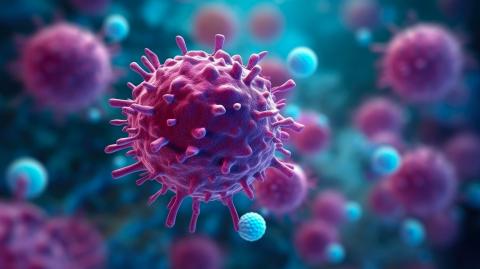Clínic Hospital
If you are the contact person for this centre and you wish to make any changes, please contact us.
Head of the Cardiology Department at the Hospital Clínic de Barcelona and researcher at the National Centre for Cardiovascular Research (CNIC) and at the August Pi Sunyer Biomedical Research Institute (IDIBAPS)
Neurologist at the Hospital Clínic in Barcelona
Head of Microbiology at Hospital Clínic in Barcelona, associate professor at the University of Barcelona, and researcher at ISGlobal Barcelona
Psychiatrist and researcher at the Bipolar and Depressive Disorders Unit of the Hospital Clínic de Barcelona
Head of the Arrhythmias and Physical Activity research group at IDIBAPS, cardiac electrophysiologist at Hospital Clínic Barcelona, associate professor of Medicine at the University of Barcelona and researcher at CIBERCV.
Professor of Psychiatry at the University of Barcelona, Head of the Psychiatry and Psychology Department at Hospital Clínic in Barcelona, and researcher at the Biomedical Research Centre in Mental Health (CIBERSAM)
Psychiatrist and researcher at the Depressive and Bipolar Disorders Unit of the Hospital Clínic de Barcelona
Assistant Doctor of Psychiatry and postdoctoral researcher at the Bipolar and Depressive Disorders Unit of the Psychiatry and Psychology Department of the Hospital Clínic de Barcelona.
Professor of Medicine at the University of Barcelona and coordinator of the Central Sensitisation Unit at the Hospital Clínic de Barcelona.
Research Professor at IDIBAPS-Hospital Clínic de Barcelona and Scientific Director of CIBEREHD - Carlos III Health Institute

Until now, perceived well-being followed a U-shaped curve depending on age, declining – due to worry, stress or depression – until people reached middle age, around 50, and then rebounding into old age. With malaise, the U is inverted and we talk about the ‘unhappiness curve’, shaped like a hump. Now, research published in PLOS One with data from the US and the UK claims that this age-related malaise is declining and that there is no longer such a hump. The reason for the change is said to be the deterioration of mental health among young people, especially those under 25. The study also includes data from 44 countries between 2020 and 2025, including Spain, and confirms that the malaise no longer takes the form of a hump, but decreases with age.

At least some of the genes that enable hibernation in certain animals are also found in our DNA, but they are regulated differently. Now, researchers at the University of Utah (United States) have analyzed the human genome and identified specific regions and changes that affect this regulation, which could be useful in the future to take advantage of some of its benefits. According to the researchers, who share their findings in two papers published simultaneously in the journal Science, "there is a possibility that, by understanding these mechanisms, we may find strategies to intervene and help with age-related diseases and improve our own health".

An oral formulation of risperidone could be administered weekly instead of daily to treat patients with schizophrenia with the same efficacy, according to a phase III clinical trial published in The Lancet Psychiatry. The study included 83 patients in the United States.

An international study has warned of the potential risks of widespread use of faecal microbiota transplantation without taking into account the region of the intestine where the transferred microbes arrive. The experiment, conducted on mice and human tissue samples, showed that the microbes from the transplant—mostly anaerobic microbes from the colon—colonised the small intestine, persisted there for months and modified that new environment, causing changes in the host's metabolism. According to the authors, whose study is published in the journal Cell, this may have long-lasting and unforeseen consequences, as well as imbalances in the intestinal ecosystem of patients.

Large language models—artificial intelligence systems based on deep learning—could be useful in detecting mental health risks such as depression and suicide risk in narrative tests of patients undergoing psychiatric treatment. This is one of the conclusions of research published in JAMA Network Open, which also shows the potential of embeddings — a natural language processing technique that converts human language into mathematical vectors — to achieve the same end.

Narcolepsy type 1 is a sleep disorder characterised by excessive daytime sleepiness and cataplexy - sudden loss of muscle tone. Existing treatments are based on palliation of symptoms, with moderate success. Now, an international phase 2 clinical trial, involving CEU San Pablo University and other Spanish centres, published in the journal NEJM, shows the results of a new drug targeting the cause of the disorder. Overall, the benefits appear superior and no serious adverse effects were observed. According to the authors, ‘the results are promising’ and represent ‘a very significant impact on the quality of life of these patients’.

A phase 1 clinical trial has tested the safety and preliminary efficacy of a new form of CAR-T cell therapy - which they call “armed” - in patients with lymphoma. The novelty consists of adding another gene to help increase response. Of the 21 patients treated, all resistant to multiple lines of treatment including approved CAR-T therapies in 20 of them, 81% showed a response and 52% went on to achieve complete remission without significantly greater side effects than with the standard option. The results are published in the journal NEJM.

Cuts in international HIV funding could cause between 4.4 million and 10.8 million new HIV infections between 2025 and 2030 in 26 low- and middle-income countries. In addition, these funding reductions could result in between 770,000 and 2.9 million HIV-related deaths, according to a study published in The Lancet HIV. Five countries that together provide more than 90% of funding for international HIV interventions - the US, UK, France, Germany and the Netherlands - have announced reductions in funding between now and 2026, the article explains. This includes the immediate suspension, in January 2025, of US funding, which accounted for nearly three-quarters of the total.

In marathon runners, the myelin content of specific regions of the brain is reversibly reduced, according to a study carried out in the Basque Country. This observation is consistent with animal evidence suggesting that myelin lipids - a substance that surrounds neurons - can act as energy reserves in extreme metabolic conditions, as detailed by the authors in Nature Metabolism. The analysis is based on magnetic resonance imaging of eight men and two women before and after running a marathon. According to the study, the myelin content was fully recovered two months after the race.

According to the World Health Organisation (WHO), the prevalence of obesity worldwide has increased by more than 100 % between 1990 and 2022. This reality has been and is constantly reflected in the media, but not always narrated or illustrated in the right way. Here are some tips on how to report on this disease from experts, international guidelines and specialised image banks.